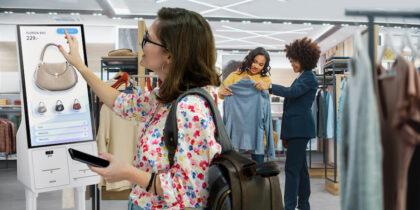Retailers and quick-service restaurant (QSR) operators with multiple locations often struggle to maintain consistent customer communications and experiences.
Part of the reason is that entry-level store associate and order counter jobs are known for high turnover. Restaurants, for example, typically lose 2 out of 3 employees every year. As for retail, the National Retail Federation (NRF) found that annual staff turnover averages over 60 percent. This can result in a near-constant need for managers to onboard and train new staff, so they provide customers with consistent, on-brand service and messaging.
In retail stores, QSRs and other businesses that operate on admission ticketing and queue management, touchscreen displays like self-service kiosks provide on-demand answers to customer FAQs. As a result, in-store touchscreen kiosks are becoming permanent fixtures.
The business case for in-store retail kiosks
Using digital screens for customer transactions, like placing orders, frees up staff to work on other tasks — and provides these added benefits:
Consistency: Self-service kiosks remove the human error that comes from staff with limited training or experience, ensuring information and messaging are always accurate and delivered as intended. Research continues to confirm that positive customer experiences influence sales and brand loyalty. The quality of customer service has become so important that observers say it’s overtaking price and product as the most influential factor in buying decisions.
Smarts: Integrated with point of sale (POS) and inventory systems, retail kiosks ensure customers have accurate, real-time information on all kinds of product information, such as pricing and availability. Your kiosk can be programmed to offer other purchase options (like ordering for later in-store pickup), remove out-of-stock items from the lookup screen or overlay a “Sold Out” icon. When a special offer ends, for instance, the time stamp you have on file ensures the offer disappears from every screen in applicable stores.
The future of retail is digital
Get your free guide to growing your retail business by adopting future-proof ecommerce technology. Download Now
Experience: Kiosks enhance the customer journey by letting patrons look up product information, make orders and complete transactions in their own time. When you customize these devices for your retail store’s buyer journey, kiosks can move customers toward a purchase and even accelerate the buying process by letting consumers bypass long lines and perform self-checkout.
Security: Samsung kiosks’ software platform secures your business and customer data from the chip up, using proven technologies like defense-grade Knox security.
Impact: Readily available self-guided kiosks can boost revenue by upselling higher-margin add-ons. Kiosks also speed up the average transaction time — increasing the number of orders that can be placed in an hour, often resulting in more overall sales. Digital ordering solution provider Tillster has found that optimized self-service kiosks typically boost the dollar value of customer orders by 15 to 30 percent.
Accuracy: Connected to your corporate inventory systems, in-store touchscreen kiosks can provide customers with progressive layers of detail — such as buying options, technical specifications and product availability. The on-screen ordering process promotes order accuracy by confirming transactions on screen prior to payment, which helps prevent errors and speeds up transactions.
Both simple and sophisticated
Samsung Kiosk provides a sleek all-in-one solution aimed at retailers, QSRs and other businesses looking to enable self-service or wayfinding. With a highly responsive 24-inch touchscreen display, speaker, credit card terminal, scanner, NFC tap and printer, the all-in-one kiosk solution operates as a single plug-and-play unit, which can be mounted to a counter, stand or wall.
Designed for easy installation and activation, Samsung Kiosk requires no custom configuration or assembly. Integrated GRUBBRR software lets retailers get started out of the box. The kiosks’ compact and modern portrait-mode design is versatile enough for any use case and offers built-in merchant flexibility. For example, the kiosk works seamlessly with a variety of POS systems, including Windows operating systems.
The system’s back end is tuned to the mission-critical business needs — with transactional security, remote access and mobile device management (MDM) tools that allow IT and operations managers to easily monitor a large deployment of dispersed kiosks across a network. In case of an outage or upgrade, you have access to remote troubleshooting, granting maximum uptime from your devices.
With Samsung’s nearly universal, highly versatile turnkey kiosk, business operators can speed operations and improve customer experience with innovative technology from a brand they already know and trust.
As you implement new retail screens, discover how you can grow your business by adopting future-proof e-commerce technology. You can also explore Samsung’s other innovative retail solutions, designed to mobilize your operations so you save time and enrich the customer experience.








